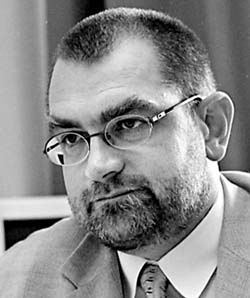Michel Duray: “NATO does not discuss dates, only results”

Last Friday Ukraine’s Ministry of Foreign Affairs hosted the launch of the Ukraine — NATO Target Plan for 2006, which President Viktor Yushchenko of Ukraine recently endorsed by an ukase. What are Ukraine’s prospects for joining NATO after the March 2006 parliamentary elections? How does the current Target Plan differ from the previous three plans? Michel DURAY, director of the NATO Information and Documentation Center in Ukraine, discusses these questions in the following interview with The Day.
“Last year the Ukrainian government stated that after the parliamentary elections it expects to upgrade its relations with NATO to the level of the Membership Action Plan. Are such expectations justified?”
“I believe that no one today can answer this question directly. Last year we started an intensified dialogue. We are expanding it, holding many meetings, exchanging experience, and explaining in detail what has to be done in order to join NATO. Alliance members have yet to see what decisions the new Ukrainian leadership will make concerning Euro-Atlantic integration. Such questions have to be discussed in a democratic atmosphere. Now it is obvious that Ukraine has a democracy and that the elections have gone very well. Now we are awaiting the government’s decisions.”
“The distinguished British expert James Sherr named two obstacles preventing Ukraine from moving on to the Membership Action Plan: the possible participation in the government of the Party of the Regions and the fact that Ukrainian society is not ready. Do NATO members share this opinion?”
“First, unlike independent experts, we cannot comment on the internal policy and processes taking place in Ukraine. But we are following them closely, of course. Second, a transition to an advanced stage of relations does not automatically depend on public support. Such support is created through the spread of information, and this requires time. I am certain that if the Ukrainian government decides to make statements about a transition to a new stage, it will do so while taking into account public opinion. If such a step is taken, I believe there is a need for public information and an information campaign. The government must bolster such an approach with arguments. Today we are unquestionably witnessing intensified dissemination of information about NATO. Various ministries are working on this. However, this does not depend on us.”
“You have probably noticed that various Ukrainian politicians have named different dates for the country’s possible accession to the alliance. Some talk about the year 2008, while after the elections others have shifted this date to 2010. What would you attribute this to?”
“Each person has his own opinion, and in the past, few Ukrainians had access to complete information about NATO. Personally, I believe that it doesn’t take a strong current of water to fill a glass. NATO cannot be sold as a commercial product; security is not a mass consumer product. This has to be understood, and to achieve this understanding it takes time and a broad discussion that would show that NATO membership does not mean that a country becomes a consumer of security, but that it must make its own contribution in the interests of the population and the country.
We do not discuss dates, only results. NATO makes its evaluations based on qualitative indicators. And the results are obvious. For example, the Target Plan for 2006 contains an objective to conduct transparent elections. Now we can state with certainty that this objective has been met. But there are other objectives, such as improving public control of the security sector and reforming this sector. This requires making additional efforts and ensuring budget transparency.”
“How does the current Target Plan differ from the three previous plans?”
“The annual Target Plan outlines measures in various spheres, beginning with domestic political issues, foreign policy, security policy, reforming security and defense structures, informing the public, issues of information security, and ending with economic and legal issues. In individual spheres targets have to be achieved by implementing internal measures, and in others, by joint measures undertaken by Ukraine and NATO. The structure of the plan remains unchanged. However, in terms of content the current document has more merits. We believe that it will make it possible to implement specific steps to carry out necessary reforms in all spheres of Ukraine’s life. The target plan envisions the involvement of NGOs in the discussion of measures to achieve targets. I consider it a very good thing that representatives of the public will make independent evaluations. This is also something that distinguishes the current Target Plan from the previous ones.”
“Which shortcomings of the previous plans were taken into account when the new plan was being prepared?”
“I believe there were problems of insufficient coordination during the implementation of this plan. Now a clearer structure is in place, and we are waiting to see how it will work in practice. An effective system of coordination has been created (so far only on paper), national coordinators have been appointed, and interdepartmental taskforces have been formed. All of this will make it possible to discuss problems that will emerge and to implement this plan as part of a transparent process. The experience of all new alliance members has shown that adequate coordination and flexibility are a guarantee of success and decisive for the end result. NATO makes its evaluations based on specific results.”






